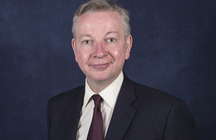Below is the text of the statement made by Michael Gove, the Secretary of State for Environment, Food and Rural Affairs, in the House of Commons on 20 March 2018.
Thank you, Mr Speaker, for this opportunity to update the House. I begin by paying tribute to the hard work of the Ministers and especially the civil servants in our country’s negotiating team, who this weekend concluded an agreement on the nature and length of the implementation period, which will help us to prepare for life after Brexit. Taskforce 50, on behalf of the EU, and our own team of dedicated civil servants secured an agreed text, which will now go to the March Council of the European Union at the end of this week, and after that the Prime Minister will update the House on Monday.
The House will be aware that there are important legal and technical questions relating to fisheries management, which means that it occupies a special position in these negotiations. Both the EU and our own negotiators were always clear that specific arrangements would have to be agreed for fisheries.
Our proposal to the EU was that, during the implementation period, we would sit alongside other coastal states as a third country and equal partner in annual quota negotiations. We made that case after full consultation with the representatives of the fisheries industry. We pressed hard during negotiations to secure this outcome, and we are disappointed that the EU was not willing to move on this.
However, thanks to the hard work of our negotiating team, the text was amended from the original proposal, and the Commission has agreed amendments to the text that provide additional reassurance. The revised text clarifies that the UK’s share of quotas will not change during the implementation period, and that the UK can attend international negotiations. Furthermore, the agreement includes an obligation on both sides to act in good faith throughout the implementation period. Any attempts by the EU to operate in a way that harmed the UK fishing industry would breach that obligation.
These arrangements will of course only apply to negotiations in December 2019. We are at the table as a full member state for negotiations in December 2018 and, critically, in December 2020 we will be negotiating fishing opportunities as a third country and independent coastal state—deciding who can access our waters and on what terms for the first time in over 40 years.
It is important that we use this transition period to ensure that we can negotiate as a third country and independent coastal state in 2020 to maximise the benefits for our coastal communities, ensure that we can control who accesses our waters and on what terms, and ensure that we manage our marine resources sustainably. We are already looking at a range of data to support consideration of future fishing opportunities, including the nature of catches and zonal attachment of stocks in the UK exclusive economic zone.
There is a significant prize at the end of the implementation period, and it is important that all of us in every area accept that the implementation period is a necessary step towards securing that prize. For our coastal communities, it is an opportunity to revive economically. For our marine environment, it is an opportunity to be managed sustainably. It is critical that all of us, in the interests of the whole nation, keep our eyes on that prize.
